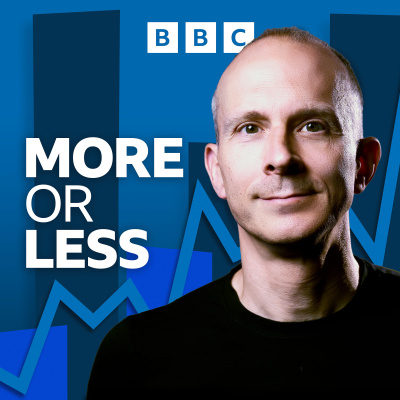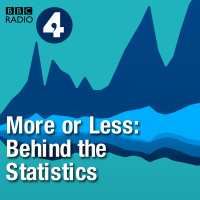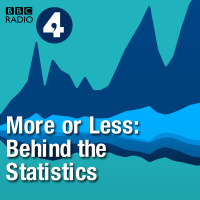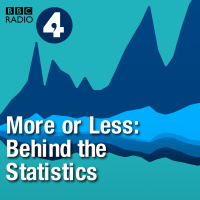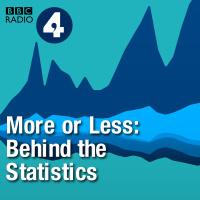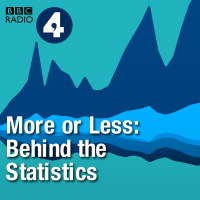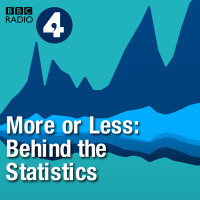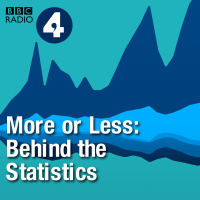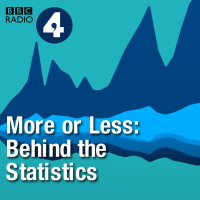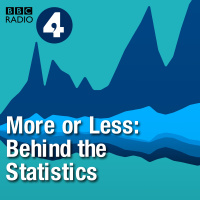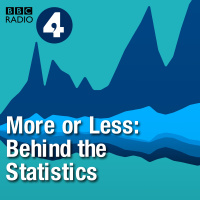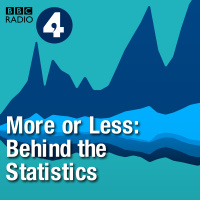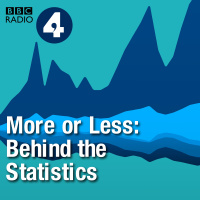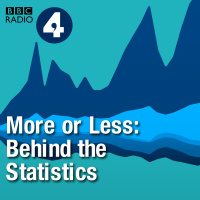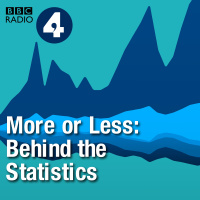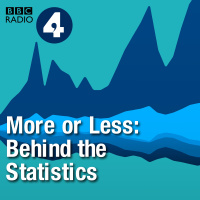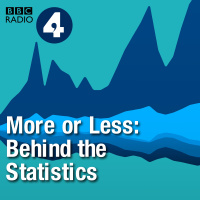Synopsis
Tim Harford and the More or Less team try to make sense of the statistics which surround us. From BBC Radio 4
Episodes
-
Nurses' pay, ambulance times and forgotten female economists
15/02/2023 Duration: 28minHow much do nurses in the UK earn compared with those elsewhere in Europe? Tim Harford and the team investigate. Also we have an update on ambulance response times, which were the worst on record in December but are showing signs of improvement. Should we use the word data in the singular or plural? The Financial Times has just changed its policy and Tim’s not happy. We look back at women who have made a key contribution to economics but have often been forgotten. And we hear how a spreadsheet error by the Office for National Statistics made the UK’s productivity appear to be one of the fastest improving in Europe.
-
Spreadsheet disasters
11/02/2023 Duration: 10minThe UK’s Office for National Statistics recently published some dramatically incorrect data - all because of a spreadsheet slip-up. But that’s just the most recent in a long list of times when spreadsheets have gone wrong, often with costly consequencesStand-up mathematician Matt Parker takes us through a short history of spreadsheet mistakes.
-
The IMF and the UK economy, NHS staff shortages and British vs English
08/02/2023 Duration: 28minThe International Monetary Fund says the UK will be the only major economy to shrink in size this year. We ask how much faith we should put in the IMF’s forecasts and look at some of the big economic challenges facing the UK. Also why the headline number of job vacancies in the NHS in England doesn’t tell the whole story of staff shortages. And why has there been such a dramatic change in whether people describe themselves as British or English?
-
Hannah Fry on using shopping data to detect ovarian cancer
04/02/2023 Duration: 09minA new study led by Imperial College in London suggests that data from loyalty card spending in supermarkets and pharmacies could be used as a way of detecting ovarian cancer much earlier. Tim Harford discusses the findings with Professor Hannah Fry, who was most recently on the show talking about her own experience with cancer.
-
Brexit and trade, pensioner millionaires and Hannah Fry on loyalty cards and cancer
01/02/2023 Duration: 28minHas trade with the EU increased since Britain left the European Union? Tim Harford and the team look at a claim suggesting just that. There’s a row over the renaming of a street in North London previously called Black Boy Lane – but how much has it really all cost? Also are there more pensioners in “millionaire households” than pensioners in poverty. And mathematician Hannah Fry talks about a new study suggesting cases of ovarian cancer can be detected by looking at spending on loyalty cards.
-
Are wild mammals only 4% of the mammal population?
28/01/2023 Duration: 10minA widely respected and cited study says humans and livestock account for 96% of all mammals on Earth. We ask how the study was carried out and what hope there might be for the future. Plus we answer another listener question about whether most mammals are in fact rodents. With the help of Dr Hannah Ritchie, Deputy Editor at Our World in Data and Dr Axel Rossberg, Reader in Theoretical Ecology at Queen Mary University of London.
-
Coffee with the Chancellor, inflation measures, GP numbers and toilet paper
25/01/2023 Duration: 28minJeremy Hunt has pledged in a new social media video to halve the UK’s high rate of inflation. Tim Harford and the team fact check the Chancellor’s claims. Also – CPI, CPIH, RPI – which measure of inflation is best for assessing the impact of the rising cost of living? Plus has the number of GPs in England gone up or down since the start of the pandemic. And does toilet paper cause 15% of global deforestation?Presenter: Tim Harford Series Producer: Jon Bithrey Reporters: Josephine Casserly, Nathan Gower, Louise Hidalgo, Charlotte McDonald Sound Engineer: James Beard Production Co-ordinator: Helena Warwick-Cross Editor: Richard Vadon
-
Does toilet paper cause 15% of global deforestation?
21/01/2023 Duration: 08minA British company has claimed that the production and use of toilet paper is responsible for 15% of deforestation globally. We investigate the claim and ask what the true environmental cost of toilet paper is. Charlotte McDonald talks to climate change scientist Professor Mary Gagen, chief adviser on forests to the World Wide Fund for Nature, the WWF.Presenter: Charlotte McDonald Producer: Louise Hidalgo and Jon Bithrey Editor: Richard Vadon Production Coordinator: Helena Warwick-Cross Studio Engineer: Rod Farquhar
-
Ambulance response times, teacher pay and Irish pubs
18/01/2023 Duration: 29minHow long are people really waiting when they call 999 for an ambulance? Tim Harford and the team examine in detail the sheer scale of delays in responding to emergency calls. We also ask why the NHS is facing a crisis when it’s got more funding and more staff than before the pandemic, with the help of Ben Zaranko from the Institute for Fiscal Studies. Plus we fact check a claim from one of Britain’s leading teaching unions about pay. And are there more pubs in Ireland or Irish pubs in the rest of the world?Presenter: Tim Harford Series producer: Jon Bithrey Reporters: Josephine Casserly, Nathan Gower, Paul Connolly Sonic Landscape: James Beard Production Co-ordinator: Helena Warwick-Cross Editor: Richard VadonImage: Andy Rain/EPA-EFE/REX/Shutterstock
-
How we shook the world of very large numbers
14/01/2023 Duration: 08minHow did an edition of More or Less from 2017 end up influencing the choice of official names for extremely large numbers? We tell the tale of how an interview between presenter Tim Harford and maths whizz Rob Eastaway did just that. Also featuring Professor Richard Brown, head of metrology at the UK’s National Physical Laboratory.Presenter: Tim Harford Producer: Jon Bithrey Editor: Richard Vadon Production Coordinator: Janet Staples Sound Engineer: James BeardImage: Large number, Credit: Getty Images
-
A&E delays and deaths, religious identity in N Ireland and naming the monster numbers
11/01/2023 Duration: 28minTim Harford and the team return for a new series of the number crunching show. With the huge pressures facing the NHS we ask how many people may be dying because of treatment delays in A&E. We hear what the latest census tells us about changing religious identity in Northern Ireland. We look at misleading claims about covid vaccines after the collapse of American football player Damar Hamlin. And we hear how More or Less has wielded its influence over how we all describe very large numbers.Presenter: Tim Harford Series producer: Jon Bithrey Reporters: Nathan Gower, Louise Hidalgo, Charlotte McDonald Production Coordinator: Brenda Brown Sound Engineer: James Beard
-
Can China's data on covid deaths be trusted?
07/01/2023 Duration: 09minWhen the pandemic took hold, the Chinese government imposed a zero-Covid policy that aimed to contain the virus through mass-testing and strict lockdowns. But early in December, amidst widespread public protests and the spread of the omicron variant to more than 200 cities, those draconian, highly restrictive measures were lifted almost entirely. For the first time in just under two years, the majority of the country’s near one-and-a-half billion citizens were free to meet, mix and mingle where they pleased, triggering what experts believe is a gargantuan wave of covid infections and related deaths. Some analysts say death rates could be as high as15,000 per day. But the Chinese authorities are reporting five or fewer deaths a day. The numbers don't stack up so More or Less's Paul Connolly speaks to some of the world's leading experts and epidemiologists to work out if China's data on covid deaths can be trusted - and, if not, what the real death toll could be.
-
Irish pubs - a global numbers game
31/12/2022 Duration: 10minIt's possible that the question we focus on in this week's programme occurred to you as you were sipping on an Irish Coffee in Bubbles O'Leary's in Kampala, Uganda: Where can the most Irish pubs be found - in Ireland? Or in all other countries combined? The popularity and sheer ubiquity of Irish pubs is a thing to behold. In 2015, the Irish Pubs Global Federation said there was approximately 6500 Irish pubs doing business outside the Emerald Isle - and our own research tells us there's at least one Irish bar in more than 160 of the world's 195 countries. But what is the secret, the recipe for global success? And can the More or Less team track down a definite number, thus answering the question some of you will have pondered whilst settling into a firelit Irish bar on a scorching hot day in rural Hawaii.
-
Numbers of the Year 2022
24/12/2022 Duration: 08minTim Harford discusses the numbers that help explain some of the biggest stories of the year, including the war in Ukraine, soaring inflation and a breakthrough for women’s football, with the help of Olga Ivshina, correspondent for the BBC Russian service; Chris Giles, economics editor of the Financial Times; Linda Bauld, professor of public health at the University of Edinburgh and Georgina Sturge, author and House of Commons statistician.
-
Qatar World Cup: the pressure of penalties
17/12/2022 Duration: 08minThe World Cup in Qatar is drawing to a close. Penalties and penalty shootouts have provided some of the biggest moments of the tournament. We analyse penalty data from the World Cup and ask what boosts the chance of scoring from the spot, with the help of Ben Lyttleton, author of Twelve Yards: The Art and Psychology of the Perfect Penalty.
-
Why are data so important in determining how we live?
10/12/2022 Duration: 08minWhy are good data so important to policymakers – whether they know it or not – and what happens when good data is missing? Presenter Tim Harford speaks to Georgina Sturge, a statistician at the House of Commons library in London and the author of Bad Data: How Governments, Politicians and the Rest of Us Get Misled by Numbers.
-
The World Cup: how many migrant workers have died?
03/12/2022 Duration: 10minQatar has been fiercely criticised over its treatment of migrant workers, many of whom have been employed to build stadiums and other infrastructure in preparation for the 2022 World Cup. We look at the wildly varying estimates of the number of migrant deaths with the help of Max Tunon, head of the Qatar office of the International Labour Organisation and Steve Cockburn, head of economic and social justice at Amnesty International.
-
When do food shortages become a famine?
26/11/2022 Duration: 08minSomalia is experiencing its worst drought for 40 years and there are warnings that millions of people need food assistance urgently. The UN body tasked with classifying levels of food security has projected a famine, although no official declaration has yet been made. We ask what data is used to formally categorise famine and explore some of the difficulties in collecting it, with the help of UN IPC Global Programme Manager Jose Lopez and Professor Laura Hammond, Pro Director of Research & Knowledge Exchange at SOAS. Presenter & producer: Jon Bithrey Editor: Simon Watts Production Coordinator: Jacqui Johnson Sound Engineer: James Beard(Image: People affected by the worsening drought due to failed rain seasons, look on, at the Alla Futo camp for internally displaced people, in the outskirts of Mogadishu, Somalia. REUTERS/Feisal Omar)
-
A $220 billion World Cup?
19/11/2022 Duration: 08minAs the FIFA World Cup in Qatar gets underway, and the newly built stadia, lavish hotels and transport networks come to life, More or Less investigates just how much the Gulf nation has spent in the lead-up to the tournament. Reports claim the figure could be as much as $220 billion - that’s more than Qatar's annual GDP, and more than ten times higher than the 2014 World Cup in Brazil. At an estimated $15 billion, this was previously the most expensive tournament to date. With no access to Qatar’s accounts, and with very few official figures in circulation, More or Less has recruited some of the world’s leading experts in sports finance to crunch the numbers and to ask…is this really a $220 billion World Cup?Presenter: Paul Connolly Producers: Paul Connolly and Jon Bithrey Editor: Simon Watts Production Coordinator: Jacqui Johnson Sound Engineer: Rod Farquhar (Image: Al Wakrah Stadium, the second FIFA World Cup Qatar 2022 (TM) venue: The 2022 Supreme Committee for Delivery and Legacy via Getty Images)
-
Bonus Episode: Understand the Economy
14/11/2022 Duration: 14minTim Harford brings you the first episode of his new podcast, Understand the Economy. If you’ve been missing his dulcet tones, here’s a chance for you to have a preview of Tim Harford’s latest podcast, in which he offers really simple explanations to help make sense of the economy today. If you enjoy it, you can find the rest of the series on BBC Sounds or wherever you get your podcasts. In this episode, inflation. What is inflation, why does it matter, and is someone to blame if it goes up? Understanding inflation will help you understand why your shopping is getting more and more expensive and why prices rarely seem to go down. Tim Harford explains why the inflation figure you see on the TV might not reflect the price rises you’re experiencing and economic historian Victoria Bateman tells us why having a boat load of silver coins isn’t always a good thing. Everything you need to know about the economy and what it means for you. This podcast will cut through the jargon to bring you clarity and ensure you fina
